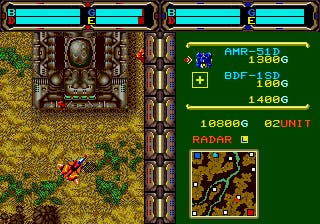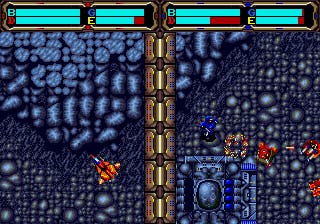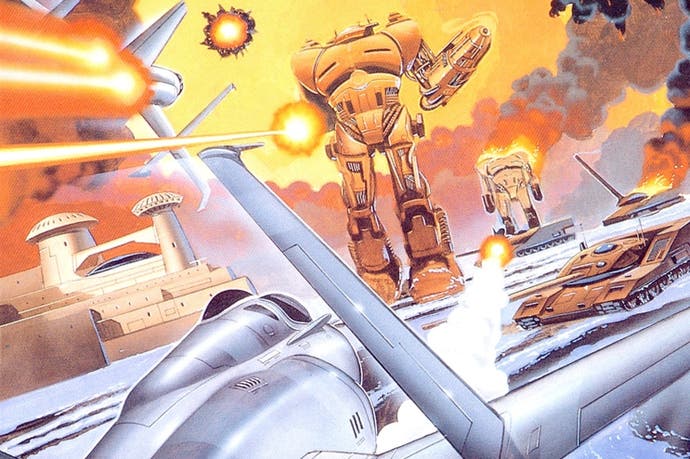Herzog Zwei retrospective
Always bet on duke.
Sometimes you discover excellence in totally unexpected places. When my dad purchased a shiny new Japanese Mega Drive in 1990, I was immediately overawed by the likes of Golden Axe, Super Monaco GP and Thunder Force 2, but it would be an obtuse and almost unfathomable action strategy hybrid with a crazy German moniker which would consume the vast majority of my time over that particular Christmas break.
Techno Soft's Herzog Zwei was bundled with the console when my dad bought it, thrown in by the desperate storeowner at a discount purely because he was struggling to shift copies. I became acutely aware of why this was the case when I booted it up for the first time - it was quite unlike anything I'd previously experienced in my admittedly brief career as a gamer, with mechanics so alien to my 11-year-old mind that even the poorly-photocopied sheet of translated instructions failed to fully dissipate the cloud of befuddlement. Bloody-minded determination and some sage advice from my gaming-savvy dad ensured that the irksome veil of confusion would eventually lift, revealing one of the most compelling strategy titles ever crafted.
Techno Soft's unassuming effort - a sequel to an MSX and PC-8801 title known purely as Herzog (which means "Duke" in German) - is cited by many as the first true Real Time Strategy game. However, it does a good job of hiding this fact behind the company's trademark brand of "shmup" action; viewed from an overhead perspective, the game is uncannily reminiscent of sections in stablemate Thunder Force 2, which had launched on Sega's 16-bit console just a few months earlier. It's likely that this shared lineage is what led many players to come away disappointed - while Herzog Zwei certainly provides plenty of tense action, it's a long way from being a traditional blaster.
Placing you in the cockpit of a futuristic jet fighter capable of morphing into a robot at the tap of a button, Herzog Zwei had an obvious appeal to my pre-teen mind - a mind only just coming to terms with the process of putting aside Hasbro's iconic Transformers toys for interactive forms of entertainment. In jet-form, you can pick up units you've constructed and deploy them elsewhere in the field, lending your metallic avatar a role that is comparable with the mouse pointer in Westwood Studios' Dune 2 - a more traditional example of an RTS title that, at the admission of its developers, was heavily influenced by Herzog Zwei.

The ultimate objective is the destruction of the enemy base - an outcome which is only achievable by using your constantly-replenishing stock of cash to create an army of foot soldiers, motorcycles and tanks, as your own robot's weapons are incapable of damaging the opposition HQ. You overriding task - aside from building units, assigning them orders and marshalling them around the game's 8 distinct maps - is to provide support by opening fire on enemy forces and airlifting damaged troops to safety.
Herzog Zwei is almost impenetrable to newcomers, but in my case it had nothing to do with it being a Japanese import - there isn't a single piece of kanji anywhere in the game. Instead, an icon-based interface is used to create units and give them orders, such as patrol, remain static, attack the enemy HQ or advance to the nearest neutral outpost. Outposts are dotted around the map and require four foot soldiers to occupy them before they fall under your control; once this happens, you can use them as a vital staging-post from which you can collect freshly-assembled units and replenish your mech's shields and fuel. Controlling as many outposts as possible becomes a prime concern, and much of the game is spent fighting tooth-and-nail with your rival for key strategic positions.
Herzog Zwei is as finely balanced as they come, with each unit in the game subject to strengths and weaknesses that make every deployment an act demanding serious consideration. Anti-air units are deadly to your transforming jet, but easy fodder for your tanks. Motorbikes are lightly-armoured but can effortlessly outpace their heavier rivals, making them ideal for drawing out enemy units and setting up an ambush. Powerful gun emplacements offer both ground and air attacks but are expensive, take long to manufacture and are completely static, meaning that placement is of vital importance. Each unit has a finite stock of fuel, which means that fragile supply trucks are required to enter the melee in order to render assistance. Herzog Zwei's dizzying level of micromanagement would have taxed even the most seasoned personal computer player of the late '80s, let alone your average console gamers raised on the likes of Alex Kidd and Wonder Boy.
When playing on your own, Herzog Zwei is a challenging and diverting experience - something my pre-pubescent self would go on to discover months after ESWAT and After Burner 2 had lost their appeal - but going up against a fellow human being is another matter entirely. Battles can last for well over an hour when two skilled tacticians are involved, with the conflict ebbing and flowing as each armchair general steals outposts, tests their rival's defenses with meticulously-organised feints and regroups as the tide turns against them.

This mesmerising dance is captivating, thanks in no small part to the fact that unlike many subsequent RTS titles, you're actually getting your hands dirty - instead of simply overseeing the unfolding conflict from the comfort of your ivory tower, you can throw your transforming jet into the middle of each skirmish, evening up the odds when your opponent's units overrun your own. This approach isn't without risk; losing all of your fuel or health results in your robot exploding and re-spawning at your HQ. There's no limit to the number of times your robot can bite the dust, but the inconvenience of being bumped back to the other side of the map can make or break your strategy - especially if your forces are being pummeled at some distant outpost. To make your direct involvement even riskier, your jet incurs a speed penalty when carrying a unit, making you a sitting duck for surface-to-air missiles - or the opposing player's jet.
That Techno Soft was able to cram all of this depth into a Mega Drive title released in 1989 is remarkable. However, the fact that Herzog Zwei defies accurate description proved to be both a strength and a weakness at the time of launch; it's quite possible that console players of 1989 simply weren't ready for a game that not only fused genres, but essentially birthed an entirely new one. Western reviewers were stumped; the game garnered some particularly dismal scores when it was released in 1990, making it very much the black sheep of the nascent Mega Drive library - although it should be noted that in the decades that have followed, critical appreciation for the game has blossomed. Dune 2 would follow in 1991 and lay the blueprint that continues to influence RTS titles right up to the present day, but Herzog Zwei arguably got the components in place first. It boasts resource management, unit production, non-linear strategy and troops which can be influenced by orders delivered on-the-fly - yet it also adds shooter-style mechanics which lend it an immediately gratifying edge.
Not that I was truly aware of its significance when I played for the first time, as I attempted to decipher the poorly-translated instructions and ascertain exactly what this intriguing piece of software was all about. Herzog Zwei cruelly never received a sequel and Techno Soft ceased to exist in 2001, but Carbon Games' AirMech is a fitting tribute to one of the Mega Drive's most underrated releases. I still possess my original copy, and the fact that it's the only game I've steadfastly refused to part with all of these years speaks volumes. Some moments of excellence are unexpected, and impossible to give up or leave behind.

